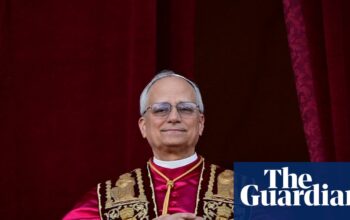Palestinian flags can be seen hanging from lampposts and adorning the entrances of warehouses above the canvas awnings throughout the bustling commercial area of Patronato in Chile’s capital.
Bakeries offer traditional Middle Eastern treats such as baklava, pita, and falafel. The shelves are filled with imported products from the Middle East, although their ingredients are labeled with Spanish translations.
In Santiago, located 8,000 miles away from Gaza, there is a strong presence and appreciation for Palestine’s cause and culture. Chile has the largest Palestinian diaspora outside of the Middle East, with approximately 500,000 individuals residing here.
“I wish to state that our support stems from a natural empathy for human struggles,” explained 28-year-old Dalal Marzuca, a Chilean Palestinian of third-generation. “However, it’s probably more due to the fact that everyone here has a friend, coworker, or classmate with Palestinian roots.”
Marzuca is employed at a coffee shop in the downtown area that specializes in Palestinian coffee. In addition to making strong, dark coffee and serving delicious knafeh, she stays updated on the current events in Gaza using WhatsApp and Instagram.
Marzuca expressed that being both Chilean and Palestinian is a unique experience for them. They do not fully identify as either, but they are greatly impacted by the events occurring in Gaza.
In the beginning of the month, Marzuca joined a large group of individuals carrying Palestinian flags as they made their way towards La Moneda, the presidential palace in Santiago. This was part of the diaspora’s efforts to add to the international demand for a ceasefire.
“It is a human issue, not just a national one,” stated Kristal Kassis, a 39-year-old protester from Chile whose grandparents immigrated from Bethlehem. “If we look at our surroundings, we can see that many individuals who are not linked to Palestine have united with us to demand justice.”
Demonstrators wearing keffiyehs held signs denouncing the Israeli bombing of Gaza City and were guided in chanting for Chile to sever all connections with Israel by the pulsating sound of kettle drums.
At a later point in the march, 57-year-old Mirvat Quesieh Abu-Gosh stood in front of La Moneda, proudly displaying Palestine’s flag in black, white, green, and red on her shoulder.
She expressed, with a trembling voice, that we are all enduring the consequences of this situation, which was predicted to end in tragedy. It seems that no one is taking action. However, Chile welcomes you with open arms – at times, it can feel similar to being in Palestine.
Quesieh Abu-Gosh was born in Beit Jala but her family fled the town after the six-day war in 1967. They were unable to return, and so she moved to Santiago where her mother’s family were already living, and had a daughter whose father is Chilean.
There are approximately 6 million Palestinians living outside their homeland, either as refugees or migrants.
The most notable dispersion outside the Middle East can be found in Chile, while significant populations also reside in Central America, particularly in Honduras and El Salvador.
None of the three countries voted in the 1947 UN general assembly decision regarding the division of Palestine, and Chile has acknowledged Palestine as an independent nation since 2011.
Chile maintains official ties with Israel, but the embassies of the two countries in Chile do not communicate with each other.
The ambassador of Palestine in Santiago, Vera Baboun, stated that their relationship with the government is highly positive. Baboun, who previously served as mayor of Bethlehem, visited Santiago to strengthen ties with the diaspora community.
Lately, time seems to move slowly at the embassy, as concerned expressions watch the Palestinian news channels on loop in every room.

“We aimed to foster a dynamic and vibrant connection between Palestine and Chile,” Baboun stated. “In Chile, the president is resolute in expressing and protecting his beliefs on human and global rights.”
Last year, President Gabriel Boric’s administration stated that they intend to establish an embassy in Palestine, but did not provide a specific timeline for the action.
This month, Boric made the decision to bring back Chile’s ambassador from Tel Aviv due to Israel’s failure to follow international law. While Boric has denounced Hamas’s violent actions on October 7th resulting in the deaths of over 1,200 individuals, he has also criticized Israel’s response, which led to the deaths of approximately 13,000 to 15,000 Palestinians, as being excessive.
During the month of October, his administration contributed $200,000 to a United Nations fund for humanitarian aid in Gaza. He also reached out to Palestinian National Authority leader Mahmoud Abbas to reaffirm his dedication to promoting peace and ensuring safety.
The ongoing strife in the Middle East is a significant factor in Chilean society and government.
Chilean political figures frequently engage in heated debates regarding the ongoing turmoil in the Middle East. This issue sparks strong emotions not only within the diaspora community, but also within student politics.
In 2016, Boric’s former school, the law school at the University of Chile, decided to abstain from attending events with individuals who are “representatives of the State of Israel and/or receive financial support from the Israeli embassy.”
In the late 19th century, the initial individuals from Palestine migrated to Chile using Turkish passports, having departed from the declining Ottoman Empire. They were able to establish thriving textile industries and engage in commerce.
At the start of the 20th century, a fresh influx of people traveled from European cities to Buenos Aires by crossing the Atlantic Ocean. The trip was often challenging and could last up to three months. From there, they would continue their journey into Chile by riding mules over the Andes Mountains.
The majority of individuals were Orthodox Christians hailing from Beit Jala, Bethlehem, and Beit Sahour. By the second generation, a significant number had become integrated into Catholic congregations.
In 1912, Chile established its initial Arabic newspaper, Murshid, and in a short time, 20 others emerged, forming a cultural hub.
According to Mauricio Amar, a professor at the University of Chile’s Eugenio Chahuán Arabic Studies Centre, Chilean Palestinian culture is like a time capsule. This identity exists in a space between two cultures, and the traditions that are practiced were passed down from the first generation of each family.
During their trips to Bethlehem, a group of young Chilean Palestinians were informed by their Palestinian peers that their names were considered outdated by several generations.
In La Cisterna, a bustling neighborhood in Santiago, the Club Deportivo Palestino, a soccer team established over one hundred years ago by Palestinian immigrants, competes in Chile’s premier league wearing the colors of the Palestinian flag.
A depiction of Palestine prior to the establishment of Israel 75 years ago is displayed on the left sleeve.
“Marzuca stated that these spaces hold significance for the community as they provide a meeting place for Chilean Palestinians. It is essential for individuals to maintain a connection with their cultural roots, no matter how far away they may be, as they are separated from the land their families were forced to abandon.”
Source: theguardian.com


